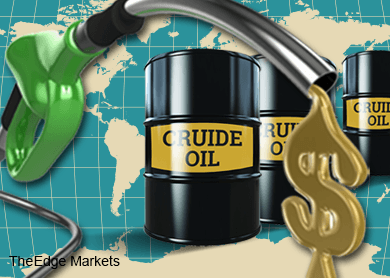
(Dec 22): Saudi Arabia, the world’s largest oil exporter, is confident that crude prices will rebound with global economic growth boosting demand.
Prices will recover from a slump due to a glut created by a lack of cooperation from producers outside the Organization of Petroleum Exporting Countries, Saudi Arabia Oil Minister Ali Al- Naimi said at a conference in Abu Dhabi yesterday. Al-Naimi ended his speech showing the confidence as he jumped off the stage and smiled.
Brent oil tumbled into a bear market this year as the U.S. pumped the most oil in more than three decades and economic growth slowed from China to Germany. The increase in global crude demand was about 700,000 barrels a day this year, below the projected 1.2 million barrels a day, Al-Naimi said.
“The oil market will recover,” Al-Naimi said. “Fossil fuel will remain the main source of energy for decades to come.”
Oil surged from a five-year low at the end of last week after Al-Naimi said the slump in prices was temporary. West Texas Intermediate climbed 4.5 percent to $56.52 a barrel on Dec. 19 and Brent advanced 3.6 percent to $61.38 a barrel. Saudi Arabia accounted for about 13 percent of global oil output last year, BP Plc estimates.
Bullish Wagers
Money managers are the most bullish since August about the rout being over. The net-long position in West Texas Intermediate rose by 26,455 contracts to 217,723 futures and options in the week ended Dec. 16, the most since mid August, U.S. Commodity Futures Trading Commission data show.
“We are now in a provisional, correctional period,” Mohammed Al Sada, Qatar’s energy minister, said at the conference. “Markets have stabilization mechanisms that will bring stability. We don’t know exactly how long it will take but it will stabilize because the current prices will separate the efficient producers from the producers who have high costs.”
Lower oil prices won’t have a major effect on Saudi Arabia’s economy, Al-Naimi said. Economic growth will expand 4.3 percent this year and 3.6 percent next year, according to analyst estimates compiled by Bloomberg.
Lack of cooperation from non-OPEC producers and wrong information in the market hit prices, Al-Naimi said. Saudi Arabia’s oil policy doesn’t target other countries, he said. If non-OPEC producers were to offer cuts, OPEC probably wouldn’t follow suit, he said. “If they want to cut they are welcome. We’re not going to cut. Certainly Saudi Arabia is not going to cut.”
Technological Developments
High prices in the past three years and technological developments contributed to increased production, resulting in lower oil prices, Al-Naimi said. Brent averaged $100.61 a barrel this year, down from $108.71 in 2013 and $111.68 in 2012.
Output in the U.S. is the highest in three decades as companies split rocks to produce shale oil. Current prices won’t stimulate investment in energy in the long run, Al-Naimi said. Less efficient oil producers will be affected by low oil prices, he said.
Oil production costs between $5 to $100 a barrel to produce, Qatar’s Al Sada said at the conference. Shale oil costs between $30 to $90 a barrel, Al-Naimi said. “The rocks in the earth are not homogeneous, they have some sweet spots, where the oil is easier to get out, and sour spots, where it’s more difficult.”
Saudi Arabia has 265 billion barrels of oil reserves, and will increase refining capacity to 3.3 million barrels a day by 2017 from 2.1 million barrels in 2014, Al-Naimi said. It’s also looking to more joint ventures in downstream projects abroad, he said.
The nation wants to become an international hub for climate change and carbon emissions research, he said. Al-Naimi attended United Nations global warming talks in Lima, Peru, this month.